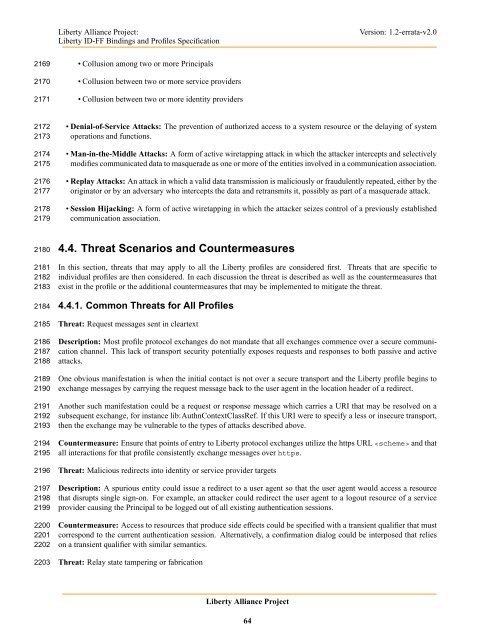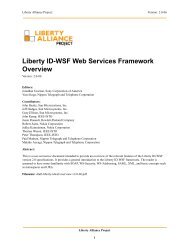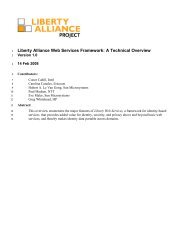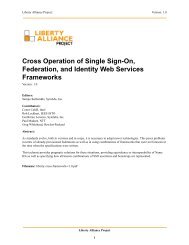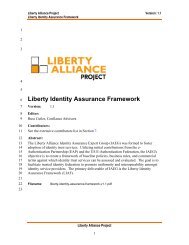Liberty ID-FF Bindings and Profiles Specification - Liberty Alliance
Liberty ID-FF Bindings and Profiles Specification - Liberty Alliance
Liberty ID-FF Bindings and Profiles Specification - Liberty Alliance
You also want an ePaper? Increase the reach of your titles
YUMPU automatically turns print PDFs into web optimized ePapers that Google loves.
<strong>Liberty</strong> <strong>Alliance</strong> Project:<strong>Liberty</strong> <strong>ID</strong>-<strong>FF</strong> <strong>Bindings</strong> <strong>and</strong> <strong>Profiles</strong> <strong>Specification</strong>Version: 1.2-errata-v2.0216921702171• Collusion among two or more Principals• Collusion between two or more service providers• Collusion between two or more identity providers21722173217421752176217721782179• Denial-of-Service Attacks: The prevention of authorized access to a system resource or the delaying of systemoperations <strong>and</strong> functions.• Man-in-the-Middle Attacks: A form of active wiretapping attack in which the attacker intercepts <strong>and</strong> selectivelymodifies communicated data to masquerade as one or more of the entities involved in a communication association.• Replay Attacks: An attack in which a valid data transmission is maliciously or fraudulently repeated, either by theoriginator or by an adversary who intercepts the data <strong>and</strong> retransmits it, possibly as part of a masquerade attack.• Session Hijacking: A form of active wiretapping in which the attacker seizes control of a previously establishedcommunication association.2180218121822183218421852186218721882189219021912192219321942195219621972198219922002201220222034.4. Threat Scenarios <strong>and</strong> CountermeasuresIn this section, threats that may apply to all the <strong>Liberty</strong> profiles are considered first. Threats that are specific toindividual profiles are then considered. In each discussion the threat is described as well as the countermeasures thatexist in the profile or the additional countermeasures that may be implemented to mitigate the threat.4.4.1. Common Threats for All <strong>Profiles</strong>Threat: Request messages sent in cleartextDescription: Most profile protocol exchanges do not m<strong>and</strong>ate that all exchanges commence over a secure communicationchannel. This lack of transport security potentially exposes requests <strong>and</strong> responses to both passive <strong>and</strong> activeattacks.One obvious manifestation is when the initial contact is not over a secure transport <strong>and</strong> the <strong>Liberty</strong> profile begins toexchange messages by carrying the request message back to the user agent in the location header of a redirect.Another such manifestation could be a request or response message which carries a URI that may be resolved on asubsequent exchange, for instance lib:AuthnContextClassRef. If this URI were to specify a less or insecure transport,then the exchange may be vulnerable to the types of attacks described above.Countermeasure: Ensure that points of entry to <strong>Liberty</strong> protocol exchanges utilize the https URL <strong>and</strong> thatall interactions for that profile consistently exchange messages over https.Threat: Malicious redirects into identity or service provider targetsDescription: A spurious entity could issue a redirect to a user agent so that the user agent would access a resourcethat disrupts single sign-on. For example, an attacker could redirect the user agent to a logout resource of a serviceprovider causing the Principal to be logged out of all existing authentication sessions.Countermeasure: Access to resources that produce side effects could be specified with a transient qualifier that mustcorrespond to the current authentication session. Alternatively, a confirmation dialog could be interposed that relieson a transient qualifier with similar semantics.Threat: Relay state tampering or fabrication<strong>Liberty</strong> <strong>Alliance</strong> Project64


